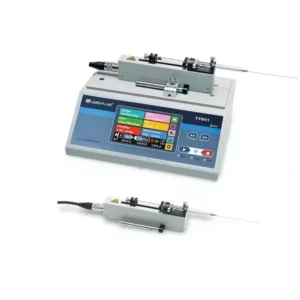Fluid transfer plays a vital role in numerous scientific, medical, and industrial applications. In this news article, we will explore three key advancements in fluid transfer technology: lab syringe pumps, gear pump applications, and high pressure syringe pumps. These innovations are set to revolutionize fluid handling processes, offering enhanced precision, versatility, and efficiency.

A brief introduction to Lab Syringe Pumps
Lab syringe pumps, also known as laboratory syringe pumps or infusion pumps, are devices used in scientific and research laboratories for precise and controlled delivery of fluids. They are commonly employed in experiments, chemical reactions, drug delivery systems, and other applications that require accurate fluid dispensing.
Working Principle:
Lab syringe pumps operate based on the positive displacement principle. They consist of a motorized drive unit that moves a syringe or plunger assembly. The syringe or plunger contains the fluid to be dispensed, and as the drive unit moves, it pushes the plunger forward, forcing the fluid to flow out through a connected tubing or needle.
Lab Syringe Pumps: Good Help in Research
Lab syringe pumps are indispensable tools in scientific research, particularly in fields such as chemistry, biology, and pharmaceuticals. These pumps provide precise and controlled fluid delivery, enabling researchers to conduct experiments with accuracy and repeatability.Features and advantages of lab syringe pumps include:
- Programmable Flow Rates: Lab syringe pumps allow users to set and adjust flow rates, ensuring precise control over the delivery of fluids. This is crucial in applications that require accurate dosing, such as drug formulation or cell culture experiments.
- Multiple Syringe Compatibility: These pumps are designed to accommodate various syringe sizes, providing flexibility in experimental setups. Researchers can choose the most suitable syringe volume for their specific needs.
- Syringe Calibration and Monitoring: Lab syringe pumps often come with calibration and monitoring features, allowing users to verify and track the actual volume of fluid dispensed. This ensures data accuracy and reproducibility.
- Automation and Integration: Some lab syringe pumps can be integrated with external devices or software, enabling automated workflows and seamless data logging. This integration enhances experimental efficiency and reduces human error.
Gear Pump Applications: Provide People with Reliability and Versatility
Gear pumps are widely used in industrial applications that require the transfer of viscous or abrasive fluids. Recent developments in gear pump technology have expanded their range of applications, offering versatility and reliability. Main features and advantages of gear pump applications include:
- Handling Viscous Fluids: Gear pumps excel in transferring highviscosity fluids, such as oils, adhesives, and polymers. Their design ensures consistent and efficient flow, even with challenging fluids.
- Abrasion Resistance: Gear pumps are built with materials that withstand the abrasive nature of certain fluids, extending their lifespan and reducing maintenance requirements.
- Precise Flow Control: Gear pumps provide accurate flow control, allowing for precise dosing and metering in industrial processes. This is crucial in applications such as chemical manufacturing or food processing.
- Compatibility with Various Industries: Gear pumps find applications in diverse industries, including automotive, pharmaceuticals, food and beverage, and chemical processing. Their versatility makes them an essential tool in fluid transfer operations.
High Pressure Syringe Pumps: Meet the Needs of Special Applications
High pressure syringe pumps are designed to handle demanding applications that require precise fluid delivery under elevated pressures. These pumps find applications in fields such as chromatography, microfluidics, and material science. Key features and advantages of high pressure syringe pumps include:
- Pressure Control: Highpressure syringe pumps provide accurate pressure control, allowing users to maintain desired pressure levels during fluid transfer. This is crucial in applications that require precise control over flow rates and pressures.
- Compatibility with Small Volumes: These pumps are capable of handling small volumes of fluid, making them ideal for microfluidic experiments or analytical techniques that require minimal sample consumption.
- HighPerformance Materials: High pressure syringe pumps are constructed with materials that can withstand the pressures involved, ensuring safe and reliable operation.
- Programmable Parameters: Some highpressure syringe pumps offer programmable parameters, enabling users to automate complex fluid transfer processes and achieve consistent results.
The advancements in fluid transfer technology, including lab syringe pumps, gear pump applications, and high pressure syringe pumps, are transforming various industries and research fields. These innovations offer enhanced precision, versatility, and efficiency in fluid handling processes, enabling researchers and industries to achieve optimal results. As technology continues to evolve, fluid transfer systems are set to play a crucial role in driving scientific advancements and industrial progress.